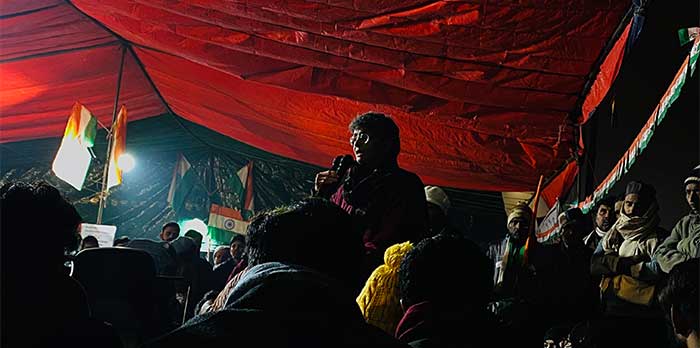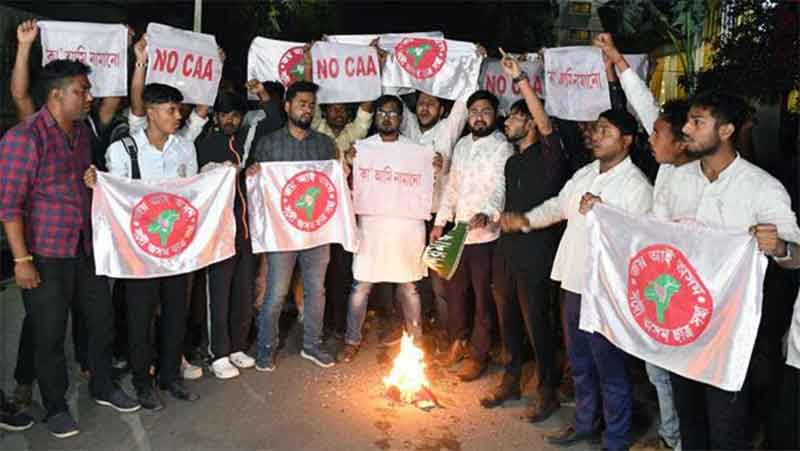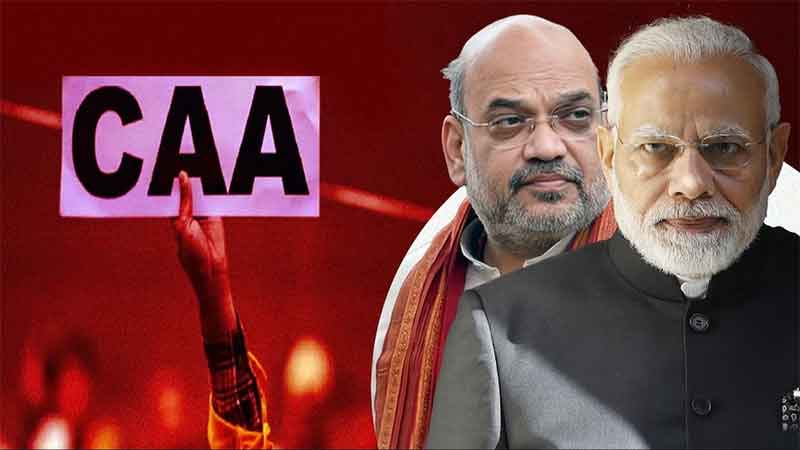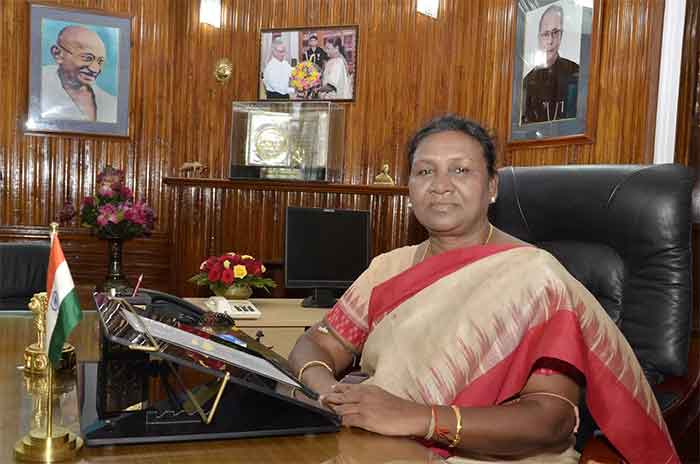
While celebrating the Republic Day, a public lecture on the topic of ‘Citizenship’ (which now has become a contentious issue after the passing of the CAA, and which has also triggered massive protests at the nation-wide,) was organized by a group of students and activists, teachers (mainly associated with JNU, DU and Jamia) under the aegis of Shaheen Ki Taleem at Shaheen Bagh on 26th January 2020 at 3.30 am in the night. The first lecture on Citizenship was delivered by the Prof. Nivedita Menon, a well- known scholar who is currently a Professor at JNU. Prof. Menon has written extensively, on themes likes Citizenship, gender politics, debates around reservations and Indian politics etc. Before formally starting her lecture, Prof. Menon expressed her deep respect to the Babasaheb Ambedkar and raised slogan like Jai Bhim, not to mention, Babasaheb also drafted our Constitution in which the idea of Citizenship based on ‘social fraternity’ is mentioned explicitly (which treat human fellow as equal citizen irrespective of caste, creed, ethnicity, gender, and religion).
In her lecture, Prof. Menon discussed a wide range of issues such as Rights of Citizens and their relation to State power. For Menon, we have rights, and it is the duty and responsibility of the state to protect our rights. For her, the rights which have been given to citizens by our Constitution like education; health and decent life, which state under no pretext can undermine and deny. The state has to abide by the Constitution and protect the rights of citizens irrespective of caste, creed, religion, and gender. In other words, the state cannot swallow our rights of the citizen as present ruling dispensation trying to be doing under the garb of exhorting the citizen of India to respect and follow duties. The idea of inclusive Citizenship enshrined (from Articles 5-11 deal with citizenship issues and Article-5 mentioned that all people living India at the time when the constitution was framed are the citizen of India) is aptly elucidated in our Constitution.
She also talked about the Citizenship Act of 1955 and several amendments (which took place in subsequent decades in 1986, 2003 and finally the passing of CAA in 2019) and its lager implications on poor masses of India, like Muslims, Dalits, Women and Adivasis and sexual minorities. While amending citizenship law in 1986, it was said that citizenship will be given to those people whose parent’s father or mother must originally belong to India. In 2003 during NDA regime, the idea of citizenship got further narrowed down when the condition was imposed that the parents should not be an ‘illegal immigrants’, as underlined by Prof. Menon during her lecture. The ill-effects of this law had come out in the public domain when the two sisters who belong to a state of Haryana put into a category of ‘illegal immigrants’ and became ‘doubtful citizen’ because of the prejudice of Sarkari Babu even their parents have been living in India since the last 50 years simply because of both sisters look and appear as ‘Napali’ in origin/color, explained by her. To note that these problems emerged further when citizenship amended and exercise like NRC had been purposed by the NDA regime in 2003, for the first time as pointed by Prof. Menon. The much expensive and unnecessary exercise like the NRC is not an essential part of our Indian Constitution.
In India, the name is generally not given when a birth certificate is made instead it is prepared with the name of Baby. This flaw can easily give an advantage to Sarkari Babu to make extra money and also put one’s citizenship under ‘doubtful’ category, Menon also stressed this point during her lecture. In one incident, Reena Ghosh, an Indian citizen could not get a PIO certificate because her birth certificate doesn’t say her name.
Prof. Menon spoke also about the history of citizenship and said that citizenship-related problems had emerged with the formation of Nation-State and when the artificial cultural boundaries in the late 18th and early 20th century was drawn and constructed in Europe, later in Asia and African countries. Earlier during the reign of Empires, the concept of citizenship did not prevail and hence, it was an invented concept not found anywhere historically. While talking about discrepancies with respect to citizenship getting amended by successive governments; she cited several cases where citizenship rights have been denied and put under the category of ‘doubtful citizen’ by the Sarkari Babu (usually call by local people to the officials at village level in the north Indian context).
For Menon and others too, the category of Citizenship is a modern construct and in the process of identifying who is a real citizen and who is not, Nation-State excluded many people and categories like ‘refugees’ and ‘illegal immigrants’ came into existence. While toeing the line of Mahmud Mamdani,( a noted scholar who has done academic research on African countries), Prof. Menon also underlined that the idea of citizenship should be based on the place of ‘labor’ not a place of ‘Birth’.
It is vital to note that states like the UK and the USA has now accommodated the these mentioned groups and as a result, the Indian origin people who are living in these countries mostly Hindus are enjoying several rights. For instance, Modi’s bhakts who are living in the USA are now enjoying rights as minority and immigrants by celebrating festivals, constructing temples and influencing the political parties in their own favor too, added by Prof. Menon. However, same people in case of India are supporting the Hindutva project to make Indian Muslim politically ‘disenfranchise’ in the public domain. While citing popular couplet written by a noted poet like Rahat Indori, sabhi ka khun shaasmil hai yahan ki miti meni, kisi ke baap ka Hindustan thodi hai, Pro. Menon expressed that the idea of citizenship must not be based on a mere accident of birth .In context of a globalized world, artificial boundaries of nation-state must be ended and labor in globalized the market should not be discriminated on the gerunds of nationalities, added by her. For Menon, subaltern people in India are suffering from poverty and unemployment not because India lacks resources but the current ruling dispensation is not willing to distribute material resources properly to address these problems. It is ironical to note that 63 richest people in India are having more money than the total Budget of 2018-2019. However, still government is giving more subsidies to rich corporates and reducing the subsidies of poor people under the false pretext of development, as pointed by Menon. The present ruling dispensation, in the name of addressing the economic crisis and pushing the agenda of the so-called development; reducing the tax burden from the rich and imposing the more taxes on the poor people was also added by her.
While discussing the role of Supreme Court vis-à-vis the current Act like CAA, she said that most of the public institutions are dominated and controlled by the RSS mined persons; hence, it is difficult to expect something positive in today’s political scenario from the judiciary. The idea of Vasudhave Kutumbkum (the world is like one family) is often cited by the Sangh Parivar, is quite opposite to the idea of Hindu Rashtra which not only exclude Muslims from citizenship but also those Hindus who belong to a state like Kerala, Northeast and elsewhere, who do not generally subscribe the north Indian savarna’s concept of ‘India’, added by the speaker.
While addressing the questions asked by several in the audience, Prof. Menon said that we have to sustain our protests at Nation-wide and compel to the opposition party to take stand against the CAA. While addressing another question on the relevance of Citizenship rights in neo-liberal phase where the government is privatizing everything, she said that current Hindutva is not against the neoliberal and promoting privatization (to note that government is committed to privatization, for example, the Railway and many other public sectors have been now privatized). In other words, we can see there are strong nexus between neo-liberals and Hindutva forces. We have no way except fighting against these forces through the non-violent methods, added by her.
While addressing question-related to the CAA and NPR, (as the ruling government is making the false arguments that through the Act like CAA, we are widening the concept of citizenship rather than snatching the citizenship of any communities as falsely propagated by Left and liberal forces), she said that there is no such provision in our constitution to conduct much expensive exercise like NRC. It is pertinent to note that the NRC and CAA-NPR are deeply intertwined and liked each other. It is wrong to say that every country in the world has a provision of conducting the NRC. Rather doing unnecessary and much expensive amidst the economic crisis, it will be good steps for the government to address the fee hikes and problems of a library (for which students of JNU are fighting), underlined by her. While responding the role of the Court to strike down the said Act, she said that “yes” Court can do, as did in the case of 377 (under this law same sex-marriages were not allowed and treated as a criminal offense, but after court intervention, this law was deleted). However, given the current political context, where the RSS is dominated over most public institutions, it is least possible that we can get justice from the Court, pointed out by the speaker. As far as finding a solution is concerned, it is difficult to question, because what the court will take the position, we cannot say anything concrete now, however, through sustain protests at Shaheen Bagh and elsewhere including in the coming days by using the power of our votes, we can change the government in times to come, added by Prof. Menon.
While concluding her lecture, she underlined that through the sustained protest as we are witnessing at Shaheen Bagh, the concept of ‘inclusive citizenship’ is getting widen and deepen everyday irrespective of caste, class, and sexuality. Amidst the darkness, finally, she expressed that we have to learn a lot from Shaheen Bagh protestors led by mainly Muslim women, which will definitely give us direction in times to come.
(The author is a Research scholar University of Delhi. I am grateful to Kamran Ali, Student at JNU, for reading this draft keenly)
SIGN UP FOR COUNTERCURRENTS DAILY NEWS LETTER














































